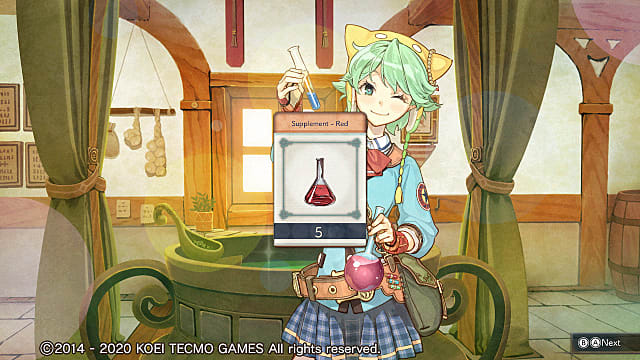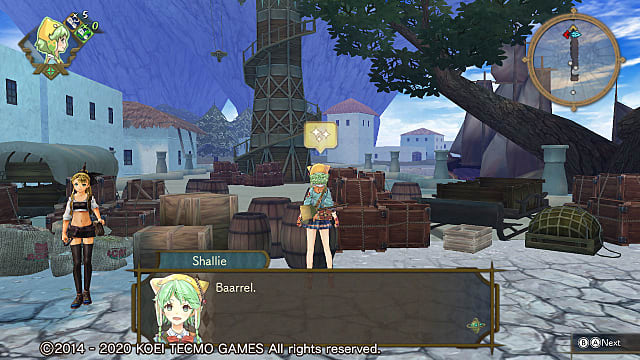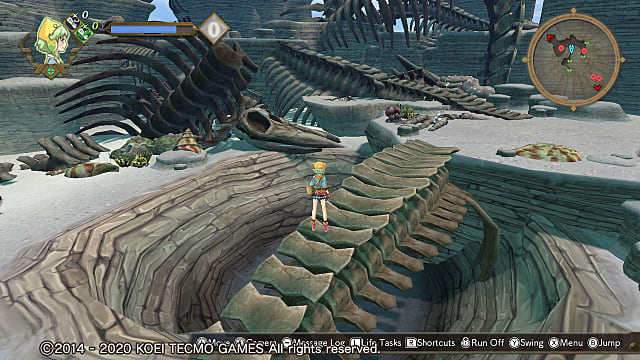

Koei Tecmo recently released the Atelier Dusk Trilogy, and we're breaking down our impressions of each entry in the collection. This review focuses on Atelier Shallie, but be sure to can check out our Atelier Ayesha DX review and Atelier Escha & Logy DX review too.
Following the logic of the previous two reviews for the Dusk trilogy, Atelier Shallie: Alchemists of the Dusk Sea DX should bear some vague resemblance to Atelier Meruru, right?
No. Very wrong. It's actually a lot closer to what Gust tried implementing with the Mysterious trilogy and finally achieved with Atelier Ryza. It's got a more involved story, a huge and gorgeous world, and improves even more on the synthesis system. However, it also stumbles in ways it really shouldn't, ultimately regressing from the successes of the first two Dusk games.
Atelier Shallie DX Review — One Step Forward, Two Back
The story is split into two this time around. One branch follows the alchemist-princess Shallistera on her journey to save her village, and the other centers on spunky tomboy Shallotte's quest to earn as much money as she possibly can. They both converge, but the differences in focus and supporting cast offer enough incentive to make playing through the other half on New Game+ worthwhile.
Like Escha & Logy, the story focuses on the problem of the Dusk, coupled with the fact that the world is basically dying. Water is scarce, oceans have dried up, and the future looks very bleak. All that ultimately takes a backseat to the usual slice of life elements related to whichever character you choose. However, it does add an interesting backdrop to these events and drives the game forward in ways the first two in the trilogy don't have.
The world of the Dusk Sea is easily the best-looking one in the Dusk trilogy as well. It's colorful, despite, y'know... drying up, there are a ton of varied areas to explore, and you actually get to rotate the camera. It adds a sense of scale to areas that are otherwise confined and close-seeming. The soundtrack is the best in the trilogy as well, and the supporting cast is, as ever, a delight to spend time with. In fact, it's safe to say the characters are the best in the trilogy, especially Shallotte.
However, the first thing you'll notice, especially if you're playing the trilogy back-to-back, is how stripped down the systems seem compared to Escha & Logy. There's no rank system, no monthly quotas to meet, no time limits — not even a calendar system of any kind. You'll take on Life Tasks for your main story missions instead. These are divided into five different categories that don't really matter as much as they should, with the most important difference just being which tasks are required.
For a long time, the tasks themselves aren't very interesting either. There's the usual mix of "craft X number of items" or "explore location Z," along with the required tasks that range from defeating monsters to finding specific items that move the story action along.
Completing some Life Tasks opens up others that require more challenge, such as synthesizing an item with a specific trait. You'll get rewards like more synthesis experience or more combat experience. Yet there's just not as much incentive to complete these tasks, and they end up feeling like you're just ticking the boxes for the sake of it.
It isn't helped along any by the sidequests you take on. Shallotte works for the local cooperative union, which dishes out tasks as you progress through the game. But they're a big step backward from previous quests, mostly being repeats of the same thing over and over again. With no calendar system, you get no real cutoff date for tasks — no "that's it for this month."
You'll see the same extermination and item gathering quests for a long time, unfortunately, and even less appealing is how for a long while, you don't even get many alchemy-related tasks. It's strange because as you complete more tasks, the union manager tells you he's got more challenging/rewarding ones for you. Only, they take their time materializing.
What's equally bizarre is that you don't have any kind of town ranking, but certain requests are posted by specific, named characters. Completing them doesn't matter, though, so why bother?
The Life Tasks are a little confusing at times too. Their titles sometimes correspond with what you had to do to unlock them, not what you need to do for completion. If you haven't completed a required Life Task yet or progressed to a certain point, you can't even look at them. You'll still see them unlocking as a memo to the side, which is annoying because you can't see what the requirements are or anything.
Synthesis in Atelier Shallie emphasizes Alchemy Skills and the order of items more than previous entries, so you'll be paying a good deal more attention to traits and elements. It's a seriously engaging system, which makes its almost complete lack of importance early on so disappointing.
Combat is more mixed. It completely does away with the usual Assist attacks and relies on Burst Mode. You'll enter Burst Mode after dealing a certain amount of damage, and in Burst Mode, attacks are stronger. You can chain them for greater damage, and after chaining so many attacks, you'll unleash an even stronger attack.
That, combined with the ability to Break enemies and then certain skills that have lingering effects do make Atelier Shallie's combat some of the most enjoyable in the series. At the same time, removing the added layer of the Assist features emphasizes how basic the system ultimately is.
Atelier Shallie has the fewest endings in the trilogy, though you'll need to play both stories — one regular, then one New Game + — to unlock the True Ending. Fortunately, since the DX version is based on the Plus version, you get the additional chapters that help flesh the story out. Even if you don't try for the True Ending, it still has a satisfying conclusion.
Atelier Shallie DX: The Bottom Line
Pros
- Best cast of characters in the trilogy
- Good combination of overarching story and slice-of-life
- Crafting system gets even more engaging
- Fun, though basic, combat
Cons
- Still wonky localization
- Too many repeat tasks that don't take advantage of the game's systems
- Convoluted Life Task system and method of progression
- Not enough interesting quests and tasks to justify removing the time limit
- Burst is a fun combat mechanic, but stripping the Assist system makes it too simple
All in all, Atelier Shallie is the weakest part of the Dusk trilogy. It's ambitious in doing away with the time system and trying for a more flexible approach. But there's just not enough worthwhile content to make the freedom and flexibility a satisfying trade-off for the systems it does away with, and it doesn't make good use of its own strengths.
It's still a fun romp, and Shallotte is one of the best protagonists in the series, but it's a shame knowing it could have been even better.
[Note: A copy of Atelier Dusk Trilogy was provided by Koei Tecmo for the purpose of this review.]



0 comments:
Post a Comment